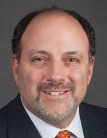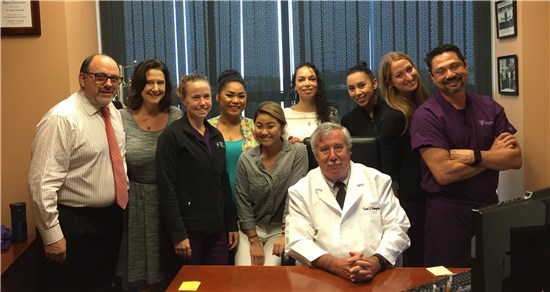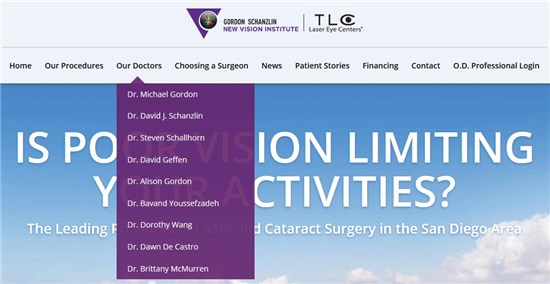By David I. Geffen, OD, FAAO

July 13, 2016
Adding partners to our shared OD-MD practice has been a cornerstone of growth. It has allowed us to offer a diversity of services to patients, helping us to expand patient care and revenues.
My current partners and I have been together for 23 years. We are currently a three-partner practice. When we formed the practice, we initially had three partners and added a fourth after seven years. We had one partner retire, and brought in a new one a few years later, and had one partner have heath issues and restrict his practice time, and pass away last year.
We never said we needed X number of partners. We looked at our patient volume and market forces to decide on adding people. When there was an opportunity to bring in someone who would add to the overall practice, we would add a new partner. To be a partner one would need to establish minimal patient numbers and production.
We also have three associate doctors in the practice.
The homepage of Dr. Geffen’s practice, listing the nine doctors in his shared OD-MD practice. Of the nine on staff, three, including Dr. Geffen, are partners. Dr. Geffen says the key to managing debate and disagreement on a multi-doctor staff is mutual respect.
Create Relationships Based on Trust
Trust is the most important factor in a good partnership. You must be able to depend on your partners to make decisions in the interest of patients and the practice as a whole to get to the next level. Sometimes this means putting aside personal benefits and goals for the growth of the practice.
Knowing that your partners are practicing at a level that makes you proud and comfortable is imperative to have this trust. Communication is extremely important for a successful partner relationship. There will be times that your partners may not see things as you do and some heated discussions will eventually occur.
Being able to respect each others’ positions and walk away at least being made to think your issues were taken seriously, even if not agreed with, is vital. We have had many issues come up over the past 23 years of our relationship. Some were related to personal issues, equipment purchases, compensation packages and even practice buyout proposals.
At the end of the day, we each had our say and almost always presented a united front to the outside. Equipment issues are great examples of how our partnership works. Especially since we are and OD-MD partnership, there are different equipment needs for different parts of the practice. When wanting to add a new piece of equipment I need to present the benefits to the practice and the costs, as well as potential revenue. As long as I make my case the partners have always supported my requests within reason.
Trust again is the most important thing to keep a competitive atmosphere from destroying the practice culture. How the income is distributed is important in this regard. Partners must be rewarded fairly based on both their production, as well as what they do for the practice. Also, if the partners have different areas of expertise this helps keep the competitive nature away. In my situation it is easy, since I do most of the primary care and contact lenses, so I have no hesitation to refer for surgical care to my partners. Discussion on how we refer at meetings is helpful to create a unified culture in the practice.

Dr. Geffen (far left) with his partner, David Schanzlin, OD, (seated) with some of the practice’s staff. Dr. Geffen says regular meetings between the partners, including one or two yearly retreats, help keep the partners on the same track in planning for the future.
Build a Unified Practice Vision
It is important for the practice to have a unified vision. If you have a practice with multiple partners, and several visions for the practice, there will be constant bickering and poor feelings. Having great communication is critical, and the practice must have a central vision that can be perceived by the entire staff or there will be silos and competitive factions. We have always had weekly partner meetings to go over issues that arise, as well as to look at the business side of the practice. We have one or two retreats a year for more in-depth strategic planning.
Constructively Work Through Disagreements
Disagreements will eventually occur in any practice, and the key to a successful partnership (which is like a marriage), is compromise. If you have a partner who is never willing to give a little on occasion it will lead to discontent and most likely the break up of the partnership. I know of partnerships with very successful practices that break up due to one partner never willing to compromise on his ideas making the other partner so discontent that he felt better leaving the successful partnership for a less stressful life.
The trust that is the building block that a partnership is built on will help keep disagreements from percolating and become a break-up decision. Being able to freely express your ideas and concerns will keep all the partners active and positive in the practice. When there is tension among the partners the entire office will feel this and it will make the staff be on edge, and eventually will affect patient relationships.
Complement Strengths
Great partnerships use the strengths of each partner. We have been fortunate in that each of us has slightly different strengths in the practice. We historically have had one who is more marketing- and future-thinking, one who is more business-minded looking at the details of the expenses and income, and one who is more of the sounding board, and who is the most approachable. This has helped keep staff motivated and keeps us on the leading edge of new techniques and equipment. When a new practice opportunity comes along we have one who can envision how this affects the practice for years to come, one who can see the financial implications of the decision and one who can help implement the decision.
In an OD-MD practice I feel it is easier since our roles are determined by our scope of care. My partners do not want to do primary care or contacts or dry eye workups. They do not want to see the minor problems, so they are more than fine having the ODs see these patients. Conversely, I do not hesitate to refer surgery or some of the more unusual problems that we see. It is also great to be able to walk across the hall and grab one of our MDs to take a quick look at a patient for whom I’m just not sure of the treatment. This is a huge benefit for our patients.
My MD partners push me to do more than I was always comfortable with. They have complete confidence in my ability, as I do with them, so when we cross-consult, it is with such confidence that there is no patient push back. This practice modality has given me the opportunity to participate in cutting-edge surgical procedures doing the follow-up care on very interesting new technologies. We participate in many clinical trials for various companies. Occasionally we have a patient who says they don’t want to see an OD, so the surgeons will see those patients, but they try to introduce me and talk about my expertise and how I could better handle the patient’s case. It is the confidence we have in each other that builds the practice.
Put Partnership Agreements in Writing
It is vital to have a partnership or corporate agreement signed. Unfortunately, things happen and people may change, or their ideals change. There need to be agreements in place for exiting, and how that partner is compensated, as well as what happens in the event of ill health or death. The agreement needs to be worked on by attorneys and or consultants familiar in this area. This is money well spent, so that all the partners know the implications of most situations. Try to anticipate every situation upfront to save yourself and your relationships on the back end. Too many partnerships end badly, and long-time friends never speak to each other, over things that could have been prevented with a proper agreement upfront.
When one partner is out of alignment we have a partner meeting and try to air out all the concerns. If all else fails we have that partnership agreement we all signed to tell us there is a way out!
David I. Geffen, OD, FAAO, is a partnerin Gordon Schanzlin New vision-TLC in La Jolla, Calif. Contact: dig2020@aol.com


























